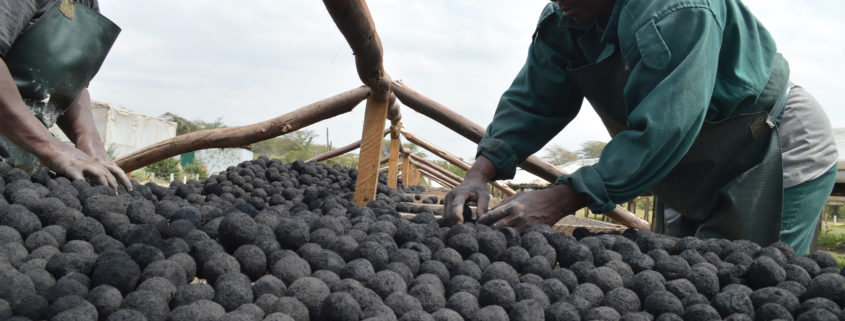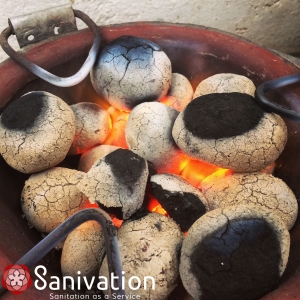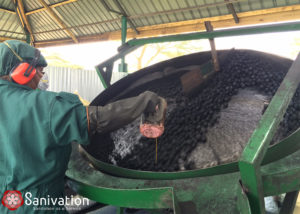Sanivation: Innovative fecal sludge treatment plants to reach SDG 6
 With the Millennium Development Goals, countries raced to increase access to basic sanitation facilities. Now to achieve Sustainable Development Goal 6 of safely managed sanitation, municipalities face a new challenge – finding cost-effective ways to process the fecal sludge from these basic sanitation facilities. In Kenya, while 80 percent of the urban population relies on these basic on-site sanitation facilities, less than 10 percent of the created waste is properly treated before being disposed in the environment. As a result, diarrhea is the second leading cause of death for children under five and the country loses an estimated US $324 million per year because of poor sanitation.
With the Millennium Development Goals, countries raced to increase access to basic sanitation facilities. Now to achieve Sustainable Development Goal 6 of safely managed sanitation, municipalities face a new challenge – finding cost-effective ways to process the fecal sludge from these basic sanitation facilities. In Kenya, while 80 percent of the urban population relies on these basic on-site sanitation facilities, less than 10 percent of the created waste is properly treated before being disposed in the environment. As a result, diarrhea is the second leading cause of death for children under five and the country loses an estimated US $324 million per year because of poor sanitation.
Sanivation’s Process
With Sanivation’s innovative waste processing technologies, wastewater treatment systems are no longer the only answer to on-site sanitation challenges. Sanivation’s solutions enable municipalities to achieve waste processing that is both affordable and scalable. Sanivation partners with municipalities and water service providers to conduct sanitation planning and then build fecal sludge treatment plants (FSTPs), or what they call “factories.”
At these factories, they treat fecal sludge and transform it into a sustainable charcoal alternative valued at over $200 per ton. These high-value briquettes enable them to deliver cost-effective sanitation services and help municipalities reach Sustainable Development Goal 6 of 100 percent safely managed waste. By selling this fuel back on the market, Sanivation is showcasing a replicable and financially-sustainable model for municipal-scale fecal sludge management. They have already launched two of these factories, one in Naivasha, Kenya and another in Kakuma Refugee Camp.
Just the Beginning
Founded in 2014, Sanivation first piloted their waste treatment technologies in Kakuma Refugee Camp where they taught refugees how to manage the system in just one month. After the pilot, Sanivation established their headquarters in Naivasha to meet the demand for sanitation services in urbanizing communities. To prove their concept of decentralized fecal sludge management, Sanivation offered a subscription-based, in-home sanitation service to families in Naivasha. They installed container-based toilets in the homes of the urban poor, and charged a small monthly servicing fee. The waste was then collected and brought to their processing plant for treatment and to produce their waste-based charcoal briquettes.
The Sanivation treatment process, approved by Kenya’s National Environment Management Authority and the Centers for Disease Control and Prevention, uses solar-thermal energy for pathogen inactivation. This process rendering waste safe for reuse at a low cost. The treated waste is then combined with carbonized biomass residue, such as agricultural waste, to produce their eco-friendly briquettes. Through this patent-pending process, feces can be transformed into briquettes in just four days. The sale of their in-demand fuel enables Sanivation to recover their operational costs at a relatively small scale. Plus, by displacing charcoal, these briquettes save four tons of carbon dioxide equivalents and 88 trees per ton sold, which helps to combat climate change and deforestation. To date, Sanivation has carried out over 100,000 collections, treated over 14 tons of fecal sludge, and sold 60 tons of their eco-friendly briquettes.
Moving to Municipal-Scale
Because not every household will subscribe to their sanitation service, Sanivation is now launching their next phase of municipal-scale fecal sludge management by taking in fecal sludge from on-site sanitation sources, like pit latrines and septic tanks. In June, Sanivation signed an MOU with Naivasha’s local water service provider, NAIVAWASS, to design, build and operate a new fecal sludge management plant next to NAIVAWASS’s wastewater treatment plant. This new FSTP will treat 100 tons of fecal sludge from non-sewered sources, or the equivalent sludge of 1,500 people. The FSTP will then produce 100 tons of briquettes per month.
Sanivation believes that these partnerships with municipalities are the fastest way to scale their services and impact. In the future, Sanivation aims to work directly with municipalities to develop five-year county wide sanitation plans and secure simplified project financing to build new fecal sludge treatment plants, tackling SDG 6 through these innovative public-private partnerships.







Leave a Reply
Want to join the discussion?Feel free to contribute!